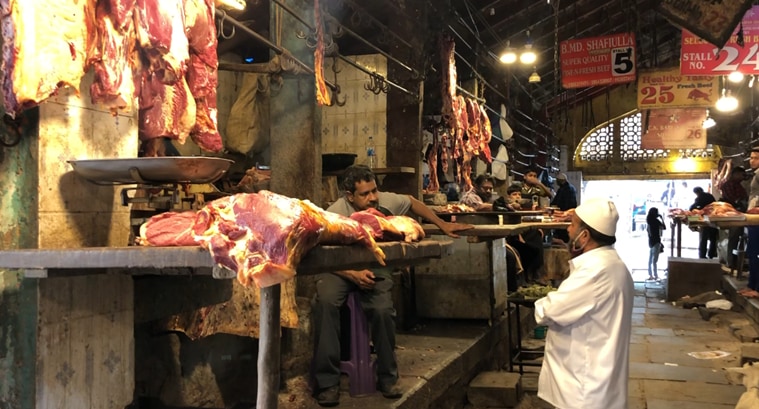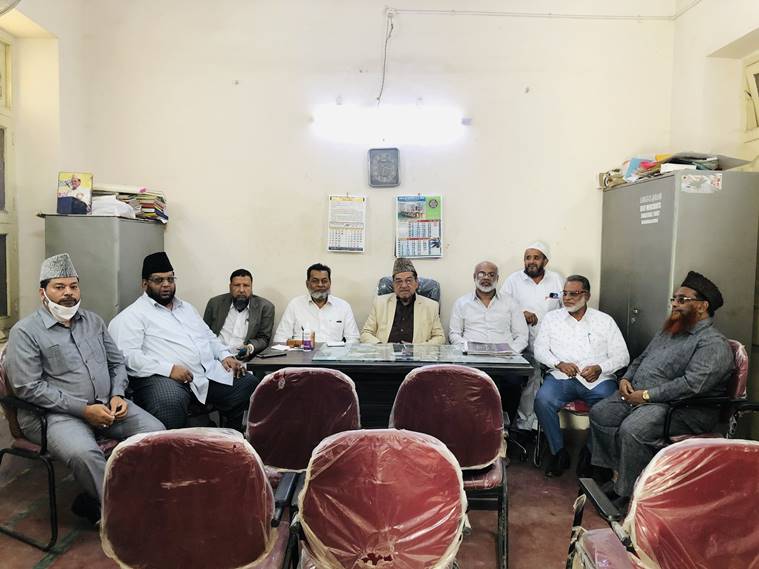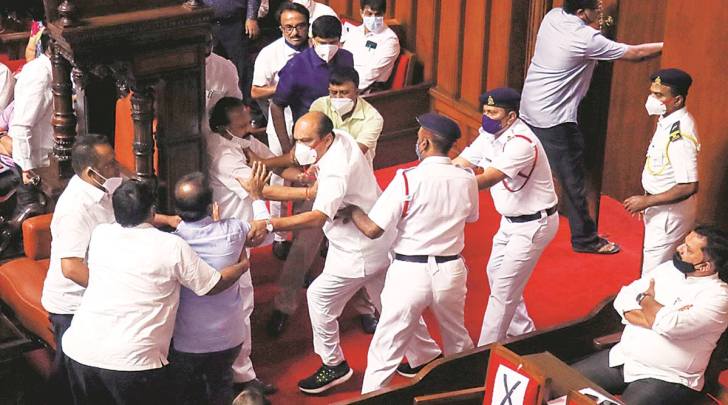No longer simply beef-eaters, Karnataka’s anti-cattle slaughter invoice will hit farmers, tanners and extra
| Bengaluru |
Up to date: December 19, 2020 5:07:03 pm
Shivajinagar red meat marketplace in central Bengaluru is without doubt one of the greatest red meat markets within the town. (information Photograph by way of Subiksha Ramakrishnan)
Previous this month, the BJP executive in Karnataka handed the arguable Karnataka Prevention of Slaughter and Preservation of Livestock Invoice, 2020. The invoice, which replaces the less-stringent 1964 cow coverage law that prohibited slaughter of cows within the state, bans the slaughter of farm animals, whose definition it has expanded to incorporate “cow, calf of a cow and bull, bullock and she or he buffalo”. In impact, the invoice imposes a blanket ban on red meat within the southern state.
The anti-cow slaughter law, which was once handed amid loud protests by way of the Opposition, does no longer most effective have harsh provisions — 3-7 years of prison or/and steep fines upto to Rs Five lakh, and sweeping powers to the police — it is usually set to have far-reaching opposed financial implications on dairy farmers who’re already dealing with agrarian misery. Industries like leather-based and lodges also are going to take an enormous hit.
Butchers in Shivajinagar red meat marketplace in central Bengaluru, which is without doubt one of the greatest red meat markets within the town, are frightened. The marketplace provides meat around the town, from smaller lodges to superstar lodges, but even so getting masses of shoppers who purchase contemporary meat on a daily basis.
 Within the red meat marketplace in Shivajinagar (information Photograph by way of Subiksha Ramakrishnan)
Within the red meat marketplace in Shivajinagar (information Photograph by way of Subiksha Ramakrishnan)
At the back of the meat marketplace is a small lane that results in the place of business of Red meat Traders’ Affiliation of Karnataka, the place Khasim Aijaz Quraishi, the president of the Affiliation, is in a gathering with participants. The invoice, if carried out, Quraishi advised indianexpress.com, will have an effect on the livelihood of greater than 40 lakh other people within the state who’re depending on red meat and similar industry.
Quraishi says it is a politically motivated invoice. “The federal government says they’re going to give protection to cows, however see the situation of cow shelters. Cows are struggling and demise there.”
The 2020 Invoice is a harsher model of a legislation handed by way of the BJP in 2010 with BS Yediyurappa as leader minister. It aimed toward banning all varieties of farm animals slaughter by way of recommending stringent consequences for violators. The invoice was once shelved in 2013 by way of the Siddaramaiah-led Congress executive after it did not get the Governor’s assent.
The Congress had then reverted to the Karnataka Prevention of Cow Slaughter and Preservation of Animals Act, 1964, which banned killing of any cow or calf of she-buffalo. It, then again, had sure relaxations — find it irresistible allowed slaughter of bullock, buffalo-male or feminine if it was once qualified by way of a reliable authority to be above the age of 12 years, incapacitated for breeding or deemed in poor health.
Rushtum Shafiylla, secretary, Red meat Traders’ Affiliation of Karnataka, stated: “We practice the 1964 Act and feature by no means indulged in slaughtering cows. Bullocks and buffalos elderly above 12 years are slaughtered within the presence of veterinarians deputed by way of the Animal Husband Division or BBMP native civic frame.”
Quraishi additionally highlighted that red meat is ate up by way of a lot of other people from low-income teams for its dietary worth, particularly protein. “Red meat is deficient other people’s meat since they can not have enough money mutton and hen. No longer simply Muslims, a big segment of Dalits and Christians eat red meat.” In line with Quraishi, other people from the higher caste neighborhood come to Shivanagar marketplace to industry in pores and skin and bones of farm animals.
 Individuals of the Red meat Traders Affiliation of Karnataka. (information Photograph by way of Subiksha Ramakrishnan)
Individuals of the Red meat Traders Affiliation of Karnataka. (information Photograph by way of Subiksha Ramakrishnan)
Some other butcher, Mumhamad Riaz Ahmad, stated that most effective 30 according to cent of those that purchase red meat from him are Muslims whilst the remainder are from different communities.
Many imagine the invoice most effective has political motives and can result in polarisation. Chatting with indianexpress.com, a supplier available in the market, Masood Ahmad, stated, “The federal government’s goal to prohibit red meat is politics. It’ll fan communal tensions. Deficient other people like us most effective know this process and we will be able to lose our livelihood if this act comes into drive.”
Hard a complete ban on cow slaughter within the state, the BJP cow coverage cellular within the state had written to CM Yediyurappa in quest of the reintroduction of the 2010 Invoice. In the meantime, days prior to the iciness consultation started on December 7 in Karnataka’s Vidhana Soudha, Minister for Animal Husbandry Prabhu Chauhan constituted a committee to review identical stringent regulations in position in Gujarat and Uttar Pradesh.
Except for butchers, the small lodge trade, particularly in and across the Shivajinagar space, is not going to continue to exist the ban. The landlord of New Hilal eating place in Shivajinagar stated, “See our lodge menu, lots of the dishes are beef-based. There are greater than 30 eating places which can be identified for red meat dishes. What’s going to they serve in case of a red meat ban ? Greater than 100 other people, who’re operating and working lodges on this space, shall be at the streets.”
Labelling the anti-cow slaughter invoice as “anti-farmer”, the Karnataka Rajya Raitha Sangha president Kodihalli Chandrashekar stated: “After a cow or buffalo stops generating milk, farmers normally promote them as this is a burden to deal with unproductive cows. We farmers are in a position to seem after our farm animals however we would like the federal government to introduce an insurance coverage scheme in order that when our farm animals die we’re compensated.” Yediyurappa has stated the state would construct gaushalas (cow shelters) in all districts to seem after growing old cows as soon as the Invoice turns into a legislation.
Opposing the invoice, former Karnataka CM HD Kumarawamy had tweeted: “… the Invoice forces farmers to nurture them. However it’s extremely unattainable because the hybrid types like HF farm animals want at least Rs 200 an afternoon for repairs. That is extremely impractical.
Some other ancillary industry this is extraordinarily cautious is tannery. Shaik Zakeer, who owns a tannery on Tannery Street in Frazer the town space, stated: “There are round 10 tanneries left within the space after the 1964 Act was once offered. Now. if the federal government introduces a brand new invoice, they’re going to additionally close store. There may be 0 doubt about it. Round 50 households would possibly lose their supply of incomes.”
Whilst tanneries are in large part owned by way of Muslims, the labour is composed of Tamil Dalits. “Hides from listed here are despatched to Tamil Nadu leather-based trade and different portions of the rustic,” stated Zakeer.
The BJP executive would possibly promulgate an Ordinance to deliver the invoice into drive after the law, which was once cleared by way of the meeting on December 9 , hit a roadblock within the legislative council on tomorrow. The federal government had deferred tabling the Invoice amid apprehensions that it can be defeated or referred to a make a choice committee at the call for of a mixed opposition.
On December 15, the invoice was once indexed to be tabled within the Legislative Council, the place the ruling BJP does no longer experience a majority. That was once to not be. The Council witnessed prime drama with participants hurling abuses and the Deputy Chairman being pulled down from his seat over a row bearing on no-confidence movement. The Council was once adjourned sine die inside mins after it met for the day.
 BJP, Congress MLCs conflict within the Karnataka Legislative Council (PTI)
BJP, Congress MLCs conflict within the Karnataka Legislative Council (PTI)
Chatting with indianexpress.com, Vinisha Nero, the nominated Anglo-Indian legislator in Karnataka Meeting, stated it’s not the meals addiction however the financial fallout of the invoice that’s the better fear. “We completely do not need an objection to the prevailing 1964 Act, we appreciate everyone’s sentiments, however meals behavior are just a very small a part of this invoice and for our neighborhood. We’re extra involved concerning the farmers and financial have an effect on on them. Then, what concerning the wild animals in zoos” Executive can’t simply clutch away other people’s livelihoods.”
“The federal government has to have a right kind dialogue and making plans prior to bringing such expenses,” she added.
Shaji T. Verghese, president of Christian Seva Sangha in Bengaluru, stated the meat ban will result in black advertising. “ In center and lower-middle-class Christian neighborhood red meat is a staple meals. We don’t eat cow which supplies milk, the buffalo and bull are meals crop and this is a commonplace meals in the neighborhood.”
Professionals have additionally voiced issues in regards to the invoice. Prakash Kammardi, former chairman, Karnataka Agricultural Costs Fee, and retired professor of Agricultural Economics from the College of Agricultural Sciences, Bengaluru, stated “If the invoice is carried out, there shall be massive crises within the agrarian economic system of the state. Farmers shall be most influenced since they’re the principle stakeholders. They are able to’t stay the cow or buffalo when it turns into unproductive, and if the federal government forces them to stay unproductive farm animals, they may be able to’t put money into new ones for dairy merchandise or for farming.”
“This will likely make different secondary stakeholders, like butchers and other people from the leather-based trade or individuals who rely on merchandise of farm animals. All of them come below agrarian economic system as the bottom of those industries are farm animals. The ones hired in each and every of those industries will undergo acutely,” Kammardi stated.
